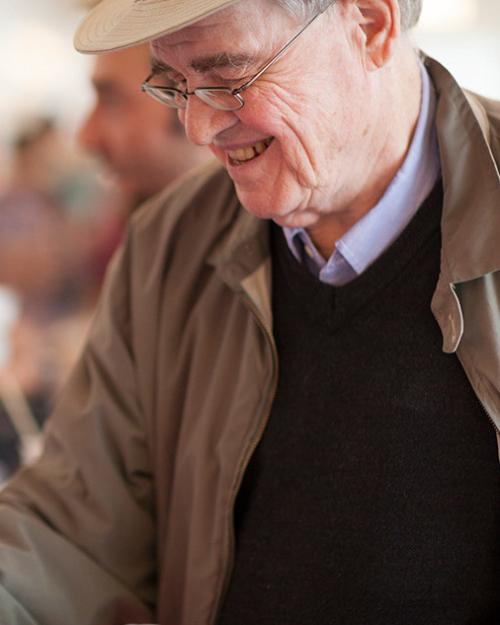Howard Howland, Ph.D. ’68, a neurophysiologist who studied the eyes of humans and animals, died Oct. 26 in Ithaca. He was 92.
Howland, professor emeritus of neurobiology and behavior in the College of Arts and Sciences (A&S), advanced the science behind aberrometers, devices that map imperfections in the eye’s optical system, used widely by vision researchers and eye care professionals. He and his brother Brandford Howland developed a noninvasive way to measure how eyes – especially those of human infants and animals – focus on objects using specialized camera and video equipment.
Howland traveled the world with his research equipment to study the vision of animals in zoos, nature preserves and the wild – including fish, crocodiles, otters, seals and Humboldt penguins in the Falkland Islands. In his lab at Cornell, Howland tracked the development of eyes in humans from infancy to adulthood, specializing in the developmental optics of human infants and young children and imperfections of the human eye.
A member of the Cornell faculty since 1969, Howland is remembered as a key researcher and teacher who helped to inaugurate studies in neurobiology and behavior at Cornell.
“Professor Howland was a valued member of the department almost from its very founding in 1964 and he taught an acclaimed course in animal physiology for generations of Cornell students,” said Kraig Adler, professor emeritus of neurobiology and behavior, who served as department chair during much of Howland’s career.
“With his broad background including a stint with Konrad Lorenz [1973 Nobel laureate] in Germany and his technological ingenuity, he added a whole different dimension to an already exciting group,” said Jack Bradbury, the Robert G. Engel Professor of Ornithology Emeritus in the Department of Neurobiology and Behavior. “Howie also cared a lot about people and gave an enormous amount to both his students and his colleagues.”
Howard Howland was born in Lafayette, Indiana in 1933. He enrolled at the University of Chicago at age 15, earning his bachelor’s degree in biology in 1952. Drafted into the U.S. Army, he served in Korea and Japan from 1953 to 1955.
In 1958, Howland earned his master’s degree in biological sciences from Tufts University and pursued further graduate study in the same field at the University of Pennsylvania. In 1968, he completed his Ph.D. in biological sciences at Cornell.
He taught at the State University of New York at Oyster Bay (now Stony Brook University) and did research at the Max Planck Institute for Behavioral Physiology in Germany before joining the Cornell faculty in 1969 as an assistant professor.
At various points during his career, Howland served as a visiting professor of optometry or ophthalmology at the University of Manchester in England, the Adler Hey Children’s Hospital in Liverpool, England, and the University of Otago in Dunedin, New Zealand.
His work was supported by multiple grants from the National Institutes of Health, and he published nearly 200 scientific papers.
Howland is survived by his wife Monica and sons Frank, Jacob and David and their families, including eight grandchildren and five great-grandchildren.
Read the story in the Cornell Chronicle.




